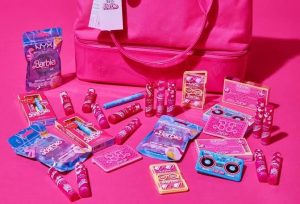By Zion Rufus, Toyosi Oladapo
In this ever-evolving landscape of brand partnerships and creative marketing strategies, the “Barbie” movie has showcased the power of synergy between entertainment and intellectual property, making more executives recognize the immense potential in extracting value from their intellectual property through the power of cinema.

The just released movie which features Margot Robbie and Ryan Gosling as Barbie and Ken, has taken the world by storm, creating a marketing frenzy and inspiring an array of brand collaborations.
Months into its scheduled release, the wave of Barbie-related content transformed everyday items into objects of Barbie-themed desire; from makeup to hair tools, drinks to clothing, roller skates to doughnuts, and even a real-life Barbie Dreamhouse Airbnb collaboration.


The movie’s marketing campaign, playful and vibrant like the film itself, sparked widespread excitement among audiences, driving a significant number of people to explore the world of “Barbieland” without truly knowing what to expect.

The movie’s global marketing strategy also made it glaring that the concept of brand-based movies is no longer just a trend but a transformative approach for companies looking to leave a lasting impact on their customers and extend the reach of their cherished brands.
Various brands across the globe also seized the opportunity to associate themselves with the iconic Mattel “Barbie” doll.

Their ingenious use of the color pink, association with plastic and toys, and collaborations with numerous brands and AI-driven tools have been hailed as marketing masterstrokes.

Richard Dickson, Mattel President and Chief Operating Officer, spoke passionately about the transformative potential of brands embracing entertainment as a marketing opportunity during his speech at Cannes Lions. He emphasized the importance of brand evolution, purpose, inclusivity, and authenticity in creating a lasting impact.
“Like the risk that we took when we changed Barbie’s body. The risk in doing the movie has been already well worth taking because reinventing when your brand is already on fire fuels a whole new creative high. We love that the creative community is inspired by the story and while there are many takeaways, let me just highlight three big ones. The first is evolution makes a brand relevant, purpose makes a brand immortal. Trends, they can come and trends will go, but values endure,” Dickson said.
“Second, your branding is stronger for the diversity that it represents and it inspires. We are using Barbie’s as a massive global platform to model inclusivity, to celebrate what unites us across generations and geographic. Third, no brand ever really truly succeeds without risking failure. Brands that matter, they can’t be selectively purposeful, selectively authentic, selectively brave, instead, they must be consistently all of these things,” he added.
Speaking further, Dickson buttressed that Barbie’s story exemplifies how embracing change and reinventing one’s brand can lead to significant success, turning it into a platform for inspiring creativity and cultural relevance.
While the intersection of entertainment and the toy industry is not a new concept, Mattel’s strategic shift from being primarily a toy maker to an intellectual property-driven entity has sparked a resurgence in brand-based movies.
The success of the “Barbie” movie exemplifies the impact of having audiences engage with a brand’s IP for an extended period through the medium of film, ultimately leading to potential sales growth.
However, producing a feature film with Hollywood A-listers like Barbie comes with substantial costs. Despite this, companies are finding innovative ways to structure deals and recoup their investments through increased product sales, leveraging the popularity generated by the film.
Variety reports that the “Barbie” movie is projected to rake in an impressive $95 to $110 million in ticket sales in North America alone on its opening weekend, potentially matching the marketing budget spent on promoting the film.
Meanwhile, Forbes believes that the clever brand activations surrounding the movie may have even doubled its earnings, indicating the sheer power of brand collaborations in the entertainment industry.
The film’s success serves as a compelling case study, urging other businesses to explore the potential of entertainment as a marketing tool and extract additional value from their intellectual property.







Comment
No comments found.